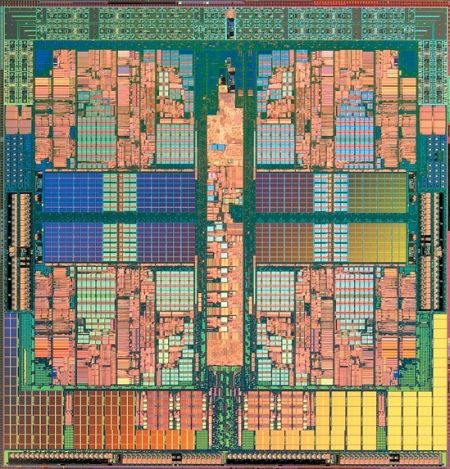Phenom vs. Athlon Core Scaling Compared
Conclusion
We compared the Athlon 64 X2 and the Phenom 9000 at different clock speeds from 2.2 GHz and 2.8 GHz, to find out if Phenom can reach better performance per clock at increasing clock speeds. We limited our testing to a single processing core, as testing with all two or four cores, respectively, results in superior performance for the Phenom 9000 across virtually every benchmark. As you could see in the benchmarks section, Phenom delivers better performance across almost all the benchmarks. We found the second diagram to be most interesting, as it shows the performance gain per core normalized to 2.2 GHz.
Performance per core does not scale as well as with an Athlon 64 X2 core between 2.2 and 2.8 GHz. This means that the performance gains of Phenom at future clock speeds will not be as significant as they have been with Athlon 64 X2 in the past. Let me give you some numbers to give you a better feeling: Athlon 64 X2 wins in 18 of our benchmarks, while Phenom 9000 only scales better in four categories. I would also like to emphasize that we used Asus's BIOS version 0603, which does not include a fix to the Phenom's TLB bug. Hence Phenom runs without any performance limitations.
Still, it's important to remember that my statements on the inferior scaling of Phenom relates to only a single processing core; looking at the entire processor with four cores (Phenom 9000) Compare Prices on AMD Phenom Processors or three cores (Phenom 7000, expected later in Q1), Phenom does and will continue to outperform the Athlon 64 X2 Compare Prices on Athlon 64 X2 Processors . Also, no one will actually run Phenom with only a single processing core, and benchmarking with only a single core also doesn't measure potential performance benefits introduced by the shared L3 cache when multiple cores access and modify the same data.
There have been similar situations in the past, where a new processor did not deliver more performance than the previous generation. Intel's Pentium 4 Prescott, its first 90 nm processor, could not outperform the 130 nm Northwood, despite some improvements. Still, Prescott was the future, as it enabled Intel to deploy more cache and also to move to a dual core design. And looking at AMD's difficulties this year, we're sure that there is a lot more to expect from Phenom as well.
Join our discussion on this article!
Get Tom's Hardware's best news and in-depth reviews, straight to your inbox.

Patrick Schmid was the editor-in-chief for Tom's Hardware from 2005 to 2006. He wrote numerous articles on a wide range of hardware topics, including storage, CPUs, and system builds.
